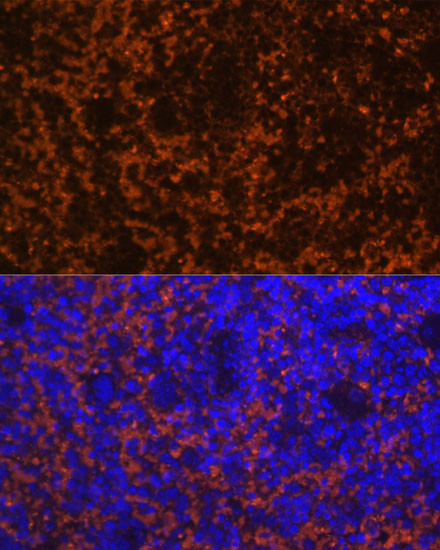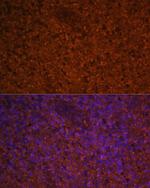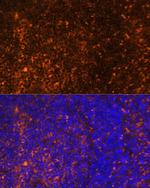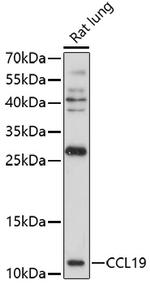Search Thermo Fisher Scientific
Product Details
PA5-109488
Species Reactivity
Host/Isotype
Class
Type
Immunogen
Conjugate
Form
Concentration
Purification
Storage buffer
Contains
Storage conditions
Shipping conditions
RRID
Product Specific Information
Immunogen sequence: GTNDAEDCCL SVTQKPIPGY IVRNFHYLLI KDGCRVPAVV FTTLRGRQLC APPDQPWVER IIQRLQRTSA KMKR
Target Information
CCL19, also known as MIP-3 beta (Macrophage Inflammatory Protein 3 beta), is a member of the CC- subfamily of chemokines. It is most closely related to CCL21, with which it shares 32% amino acid sequence homology. CCL19 and CCL21 are expressed mainly by stromal cells in the T cell-rich zones of lymph nodes. They are critical mediators of the homeostatic trafficking of naive T cells and activated dendritic cells into the secondary lymphoid organs. CCL19 and CCL21 also play a role in T cell priming and activation, as well as the recruitment of lymphocytes to inflamed tissue. Both proteins signal via the G protein-coupled receptor, CCR7, which is expressed on T cells and mature dendritic cells. Although CCL19 and CCL21 both exhibit the same affinity for CCR7, only the binding of CCL19 results in the desensitization and internalization of the receptor.
⚠WARNING: This product can expose you to chemicals including mercury, which is known to the State of California to cause birth defects or other reproductive harm. For more information go to www.P65Warnings.ca.gov.
For Research Use Only. Not for use in diagnostic procedures. Not for resale without express authorization.
References (0)
Bioinformatics
Protein Aliases: beta chemokine exodus-3; Beta-chemokine exodus-3; C-C motif chemokine; C-C motif chemokine 19; CC chemokine ligand 19; chemokine (C-C motif) ligand 19; chemokine CCL19; CK beta-11; EBI-1 ligand chemokine; EBI1 ligand chemokine; EBI1-ligand chemokine; EBV-induced molecule 1 ligand chemokine; Epstein-Barr virus-induced molecule 1 ligand chemokine; exodus-3; M-MIP-3-beta; Macrophage inflammatory protein 3 beta; macrophage inflammatory protein 3-beta; MIP-3-beta; small inducible cytokine A19; small inducible cytokine subfamily A (Cys-Cys), member 19; Small-inducible cytokine A19
Gene Aliases: CCL19; CKb11; ELC; exodus-3; MIP-3b; MIP3B; SCYA19
UniProt ID: (Human) Q99731, (Mouse) O70460
Entrez Gene ID: (Human) 6363, (Mouse) 24047, (Rat) 362506

Performance Guarantee
If an Invitrogen™ antibody doesn't perform as described on our website or datasheet,we'll replace the product at no cost to you, or provide you with a credit for a future purchase.*
Learn more
We're here to help
Get expert recommendations for common problems or connect directly with an on staff expert for technical assistance related to applications, equipment and general product use.
Contact tech support




